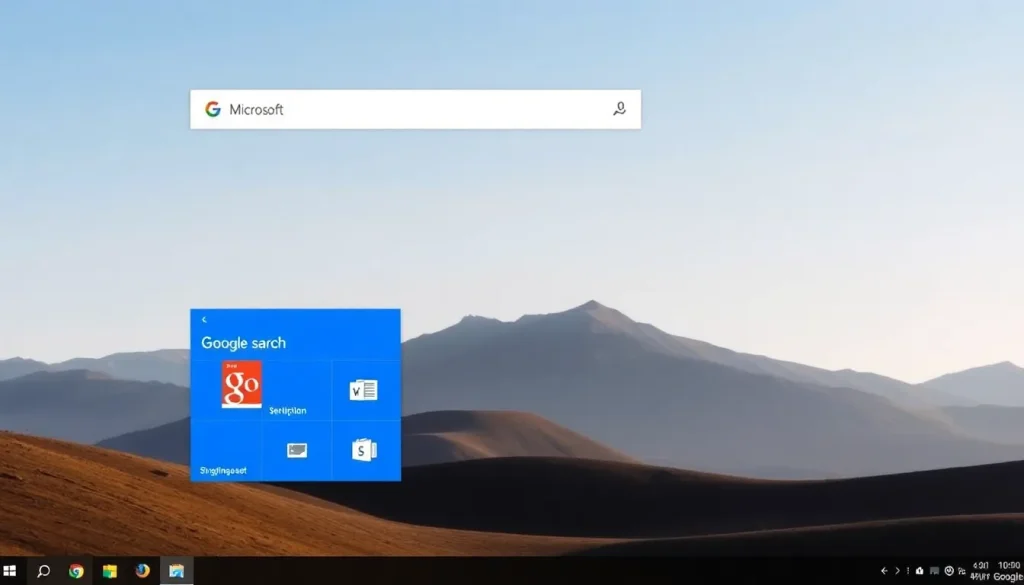Google's experimental Windows app outperforms Microsoft search

In a world increasingly driven by digital innovation, the competition between tech giants has never been fiercer. Among these titans, Google and Microsoft have engaged in a relentless battle for supremacy in various domains, particularly in search technology. Recently, Google has ventured into the desktop application realm with an experimental app for Windows, which has garnered attention for its unique features and performance. This new development promises to change the way users interact with search functionalities on their PCs.
Understanding Google's New Experimental App for Windows
Google has long been synonymous with online search, yet it has been relatively slow to develop desktop applications that leverage its extensive array of services. The newly launched Google app for Windows marks a significant shift in this trend, offering users a fresh way to explore both the web and local files seamlessly.
This app is currently in the experimental phase, meaning it's primarily available for personal Google accounts and may still have some bugs. However, its core functionality shows promise, particularly because it focuses on simplicity and efficiency. Users can invoke the Google search bar using the shortcut Alt+Space—or any preferred key combination—to enter queries quickly.
Once activated, a compact results window appears directly under the search bar, allowing users to access information swiftly without needing to navigate through cumbersome menus. Notably, the app also integrates select content from Google’s Knowledge Graph, enhancing the search experience by providing relevant information even before the user finishes typing their queries.
Comparative Analysis: Google App vs. Microsoft’s Built-in Search
When evaluating search functionalities on Windows, Microsoft’s built-in search has received criticism for its inefficiency. In contrast, Google's new app adopts a streamlined, Chrome OS-style interface that significantly improves the user experience. Here are some key differences:
- Speed: The Google app excels in speed, retrieving local files, Google Drive documents, and applications almost instantaneously.
- Unified Interface: Users can access all types of files in a single search interface, making it much easier to find what they need.
- Optional Features: Users can customize their search experience by choosing whether or not to include local files and Drive in their queries.
- Google Lens Integration: The app incorporates Google Lens, allowing users to perform image searches or translations by selecting elements directly from their screens.
Key Features of the Google Windows App
The Google app for Windows is not just a search tool; it comes packed with features designed to enhance productivity and streamline workflow. Some of the standout features include:
- Real-Time Search Results: The app provides dynamic search results as users type, saving time and effort.
- Knowledge Graph Support: Information from Google’s Knowledge Graph can surface relevant data points based on user queries.
- Accessibility: Users can invoke the search bar from anywhere on the desktop, making it easy to conduct searches without interrupting their current tasks.
- Customization Options: Users can modify shortcuts and settings to suit their personal preferences and enhance usability.
User Experience and Feedback
Initial feedback regarding the Google app for Windows has been largely positive, with many users praising its user-friendly interface and efficient functionality. The floating search bar, in particular, has been highlighted as a game-changer for those who frequently conduct searches while working on other tasks.
However, as with any experimental software, users have encountered some bugs and glitches. Google has acknowledged these issues and is actively working to refine the app based on user feedback. This iterative process is essential not just for improving the app, but also for ensuring it meets the diverse needs of its users.
Future Implications for Desktop Search Technology
The entrance of Google into the desktop search application space raises several intriguing questions about the future of search technology on personal computers. As users become accustomed to more intuitive and efficient tools, it is likely that other tech companies will feel pressured to innovate and improve their offerings.
Moreover, the integration of AI and machine learning could further enhance search capabilities, allowing for even more personalized and context-aware results. The potential for applications that understand user behavior, preferences, and needs is vast, paving the way for future developments that could redefine how we search for information on our devices.
Conclusion: What Lies Ahead?
As Google continues to refine its experimental app and gather user feedback, the company is well-positioned to make a significant impact on desktop search technology. The initial success of this app suggests that there is a substantial demand for more efficient, user-friendly search solutions in the desktop environment.
For those interested in a deeper dive into the implications of this development, a related discussion can be found in this insightful video:
In summary, the Google app for Windows represents a promising step forward in making search technology more accessible and efficient for users. As it evolves, it may very well set the standard for how we approach searching on our desktops in the future.




Deja una respuesta